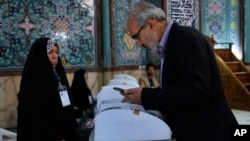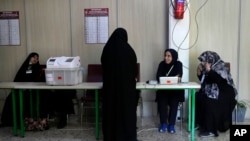
Iran's hard-liners won most of the remaining seats in an election runoff to give them full control over the country's parliament, authorities said Saturday, while not sharing any details on the turnout.
The result, and that of the previous vote in March, gives hard-liners 233 of the 290 seats in Iran's parliament, according to an Associated Press tally.
Hard-liners seek more cultural and social restrictions based on Islamic sharia, including demanding that women wear the Islamic veil in public. They also express enmity toward the West, particularly the United States.
Those politicians calling for change in the country's government, known broadly as reformists, were generally barred from running in the election. Those calling for radical reforms or for abandoning Iran's theocratic system were also banned or didn't bother to register as candidates.
Vote counting began after the ballots closed late Friday, with the election authority publishing the names of the winners the day after.
Interior minister Ahmad Vahidi said Saturday the election saw "good participation," without elaborating.
"All elected people have had a relatively good and acceptable" number of votes, he said.
The result requires approval by a constitutional watchdog. It is expected next week. The new parliament will begin its job on May 27.
The parliament in Iran plays a secondary role in governing the country though it can intensify pressure on the administration when deciding on the annual budget and other important bills. Supreme Leader Ayatollah Ali Khamenei has the final say in all important state matters.
In March, a total of 25 million ballots were cast, for a turnout of just under 41%, the lowest since the 1979 Islamic Revolution that brought Islamists to power.







